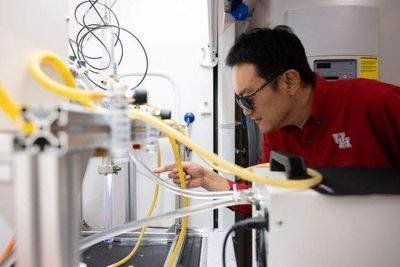Houston scientists land $1M NSF funding for AI-powered clean energy project

University of Houston professor Xiaonan Shan and the rest of his research team are celebrating fresh funding from a federal grant. Photo via UH.edu
A team of scientists from the University of Houston, in collaboration with Howard University in Washington D.C., has received a $1 million award from the National Science Foundation for a project that aims to automate the discovery of new clean-energy catalysts.
The project, dubbed "Multidisciplinary High-Performance Computing and Artificial Intelligence Enabled Catalyst Design for Micro-Plasma Technologies in Clean Energy Transition," aims to use machine learning and AI to improve the efficiency of catalysts in hydrogen generation, carbon capture and energy storage, according to UH.
“This research directly contributes to these global challenges,” Jiefu Chen, the principal investigator of the project and associate professor of electrical and computer engineering, said in a statement. “This interdisciplinary effort ensures comprehensive and innovative solutions to complex problems.”
Chen is joined by Lars Grabow, professor of chemical and biomolecular engineering; Xiaonan Shan, associate professor of electrical and computing engineering; and Xuquing Wu, associate professor of information science technology. Su Yan, an associate professor of electrical engineering and computer science at Howard University, is collaborating on the project.
The team will create a robotic synthesis and testing facility that will automate the experimental testing and verification process of the catalyst design process, which traditionally is slow-going. It will implement AI and advanced, unsupervised machine learning techniques, and have a special focus on plasma reactions.
The project has four main focuses, according to UH.
- Using machine learning to discover materials for plasma-assisted catalytic reactions
- Developing a model to simulate complex interactions to better understand microwave-plasma-assisted heating
- Designing catalysts supports for efficient microwave-assisted reactions
- Developing a bench scale reactor to demonstrate the efficiency of the catalysts support system
Additionally, the team will put the funding toward the development of a multidisciplinary research and education program that will train students on using machine learning for topics like computational catalysis, applied electromagnetics and material synthesis. The team is also looking to partner with industry on related projects.
“This project will help create a knowledgeable and skilled workforce capable of addressing critical challenges in the clean energy transition,” Grabow added in a statement. “Moreover, this interdisciplinary project is going to be transformative in that it advances insights and knowledge that will lead to tangible economic impact in the not-too-far future.”
This spring, UH launched a new micro-credential course focused on other applications for AI and robotics in the energy industry.
Around the same time, Microsoft's famous renowned co-founder Bill Gates spoke at CERAWeek to a standing-room-only crowd on the future of the industry. Also founder of Breakthrough Energy, Gates addressed the topic of AI.